| Srl | Item |
| 1 |
ID:
122150
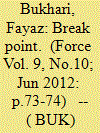

|
|
|
| 2 |
ID:
117461
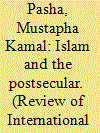

|
|
|
|
|
| Publication |
2012.
|
| Summary/Abstract |
The language of the 'postsecular' acknowledges the enduring presence of faith in politics, repudiating secularisation theses claiming diminution or privatisation of religion in social and political life. In cognitive and experiential worlds, those presumably unfettered by these conceptions (for example, the Islamic Cultural Zones or ICZs), the postsecular presents a different order of challenge and possibility. The term ICZs refers to Muslim majority areas informed by transnational subjectivities loosely connecting varied Islamic societies around symbolic commonality, memory, and historical experience. The term stresses the plurality of Islamic cultural experience, albeit distinguished by recognisable semiotic markers, without essentialising Islamic identity. This article questions the hegemonic view pervasive in both secular and postsecular theorising of the fiction of immutability of faith in the ICZs and recognises its rupture and displacement under conditions of late modernity. The ontological dislocation in the character of religion itself under conditions of late modernity opens up the possibility to account for the assumed resistance of Islam to secular modernity, but also to explain Islam's imbrications in politics read under the sign of Political Islam. Paradoxically, under the condition of late modernity, a more homogenised Islam appears to crystallise in the ICZs at odds with an 'open' Islam.
|
|
|
|
|
|
|
|
|
|
|
|
|
|
|
|
| 3 |
ID:
089371
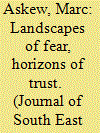

|
|
|
|
|
| Publication |
2009.
|
| Summary/Abstract |
Thai Buddhist and Malay Muslim neighbours in Thailand's Muslim-majority deep south face the challenge of managing everyday life in the midst of an enigmatic insurgency where both ethno-religious groups are victims of violence, but where the assailants are difficult to identify. This ethnographically-focused paper examines horizons of trust and suspicion as villagers confront threats to their safety, negotiate state authorities and encounter broader narratives about identity, allegiance and enemies. Although fear and suspicion sparked by the current violence have generated Buddhist-Muslim tensions in localities, neighbourhoods and village leaders also actively resist the multiple threats to their relationships and to inter-ethnic coexistence.
|
|
|
|
|
|
|
|
|
|
|
|
|
|
|
|
| 4 |
ID:
152400
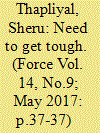

|
|
|
| 5 |
ID:
150603
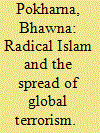

|
|
|
|
|
| Summary/Abstract |
Global terrorism is an unlawful use of violence or threat of violence aiming to inculcate fear among the masses. It is a philosophy of violence which terrorists use to destablise the social and economic set up of the country. Terrorism that occurs throughout the world is known as global terrorism. Assassinations, Bombings, hijackings, diplomatic kidnappings- is the most publicized form of political violence which terrorists carry out in order to create terror.
|
|
|
|
|
|
|
|
|
|
|
|
|
|
|
|
| 6 |
ID:
119522
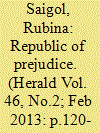

|
|
|
| 7 |
ID:
125939
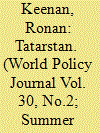

|
|
|
|
|
| Publication |
2013.
|
| Summary/Abstract |
KAZAN, Tatarstan-Shelves of vodka line a shop wall in Kazan, the capital of the Tatarstan republic. Just opposite, Islamic prayer beads sit in heaps on a rack. In this Russian-ruled region with a Muslim majority, bars and mosques exist side by side. A nearby store advertises clothing for Muslim women, and inside, Zulfia, one of the two female owners, helps customers with traditional headscarves and brightly colored skirts. Since she opened the store nine years ago, Zulfia says demand is increasing as women embrace Muslim traditions with a modern twist. Outside, the Kazan Kremlin, a citadel home to Tatarstan's president, stands elevated on the banks of the Kazanka River where its Islamic minarets and Orthodox domes overlook the city.
|
|
|
|
|
|
|
|
|
|
|
|
|
|
|
|
| 8 |
ID:
083829
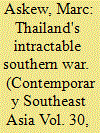

|
|
|
|
|
| Publication |
2008.
|
| Summary/Abstract |
With the complex crisis in Thailand's Muslim-majority border provinces now in its 5th year and a grim legacy of over 3,000 deaths, opinion is divided over the prospects of substantial improvement, though the authorities claim that headway is being made. This article offers a critical review of policy, key events and discourses surrounding the crisis in the south from the coup of September 2006 to the first months of the new civilian government under Prime Minister Samak. It argues that the southern situation remains intractable for a number of key discursive/political and military/operational reasons, including: the difficulty of combating a war against clandestine, cell-based insurgent groups that employ propaganda as much as violence and show no desire to negotiate; a politics of denial among single-issue groups who continue to avoid confronting the full realities of insurgent violence while condemning state officials as principal aggressors; and the difficulties confronted by authorities in pursuing a dual policy of law-enforcement and "peaceful development" in the face of incomplete intelligence and suspicious villagers. It is unlikely that the lessening of violence will be any more than incremental in the foreseeable future, or that the meaning, causes and solutions to the "fire in the south" will be any less contested.
|
|
|
|
|
|
|
|
|
|
|
|
|
|
|
|